

What Blockchain Can’t Do. Why cryptocurrencies don't make sense. I have been trying to understand what the point of cryptocurrencies is, without success.
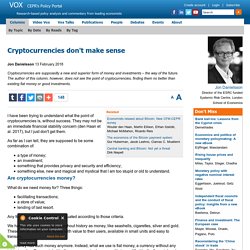
They may not be an immediate financial stability concern (den Haan et al. 2017), but I just don't get them. As far as I can tell, they are supposed to be some combination of: a type of money;an investment;something that provides privacy and security and efficiency;something else, new and magical and mystical that I am too stupid or old to understand. Are cryptocurrencies money? On Public and Private Blockchains. Over the last year the concept of “private blockchains” has become very popular in the broader blockchain technology discussion.
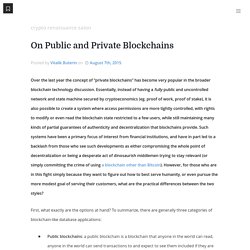
Essentially, instead of having a fully public and uncontrolled network and state machine secured by cryptoeconomics (eg. proof of work, proof of stake), it is also possible to create a system where access permissions are more tightly controlled, with rights to modify or even read the blockchain state restricted to a few users, while still maintaining many kinds of partial guarantees of authenticity and decentralization that blockchains provide.
Such systems have been a primary focus of interest from financial institutions, and have in part led to a backlash from those who see such developments as either compromising the whole point of decentralization or being a desperate act of dinosaurish middlemen trying to stay relevant (or simply committing the crime of using a blockchain other than Bitcoin). First, what exactly are the options at hand? Blockchains versus Traditional Databases. How Transactions Are Validated On A Distributed Ledger — SAMMANTICS. Blockchain – What is Permissioned vs Permissionless? – Core Dump. If you have been following distributed ledger technologies (Blockchain), you would see the term permissioned blockchain being thrown around.

What is the core difference between a permissioned vs. a permissionless blockchain? A permissioned blockchain restricts the actors who can contribute to the consensus of the system state. Blockchain et blockchain : prière de ne pas confondre. Rédigé le 26 septembre 2017 par Gérard Dréan | Bitcoin et autres cryptomonnaies, Crypto Monnaies, Guerre des monnaies, Investissement.

How Safe Are Blockchains? It Depends. Blockchain, the distributed ledger technology underlying bitcoin, may prove to be far more valuable than the currency it supports.
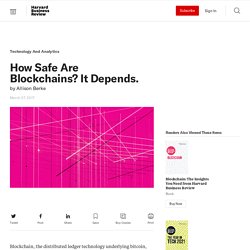
But it’s only as valuable as it is secure. As we begin to put distributed ledger technology into practice, it’s important to make sure that the initial conditions we’re setting up aren’t setting us up for security issues later on. To understand the inherent security risks in blockchain technology, it’s important to understand the difference between public and private blockchains. Bitcoin relies on a public blockchain, a system of recording transactions that allows anyone to read or write transactions. Anyone can aggregate and publish those transactions, provided they can show that a sufficient amount of effort went into doing so, which they can demonstrate by solving a difficult cryptographic puzzle. Security Starts with Network Architecture. The Truth About Blockchain. There is no such thing as “the” blockchain. Thinkstock How do you quadruple your stock price without lifting a finger?
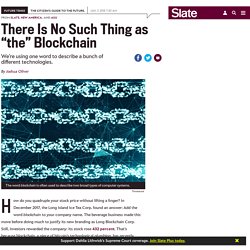
In December 2017, the Long Island Ice Tea Corp. found an answer: Add the word blockchain to your company name. In the World of Cryptocurrencies, Something’s Gotta Give in 2018. Ten years in, nobody has come up with a use for blockchain. The rise of Bitcoin doesn't mean the end of banks. Here's why. A common idea about the blockchain, the technology that powers Bitcoin and other cryptocurrencies, is that it can “create trust”, or allow two parties to make a transaction “without relying on trust”.

If true, this means we could create a world without a trusted “man in the middle”. Blockchain Security for Digital Identity – Adam C. Migus. NOTE: This is an unedited copy of a report written for DHS S&T in September 2016.
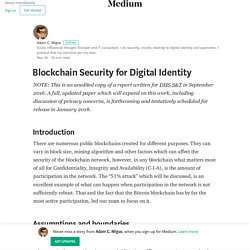
A full, updated paper which will expand on this work, including discussion of privacy concerns, is forthcoming and tentatively scheduled for release in January 2018. Introduction There are numerous public blockchains created for different purposes. They can vary in block size, mining algorithm and other factors which can affect the security of the blockchain network, however, in any blockchain what matters most of all for Confidentiality, Integrity and Availability (C-I-A), is the amount of participation in the network.
The “51% attack” which will be discussed, is an excellent example of what can happen when participation in the network is not sufficiently robust. Assumptions and boundaries The operational security of miners including their ability to protect mining computers and networks is discussed in general and the use of current cybersecurity best practices is assumed. Why a blockchain startup called Govcoin wants to 'disrupt' the UK's welfare state. The UK chancellor’s recent Budget reminded us that systemic problems continue to plague the government’s delayed roll-out of universal credit – a single monthly welfare payment that will replace six separate benefits.
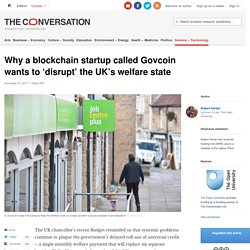
Philip Hammond also spoke of the UK government’s commitment to innovation, with the chancellor calling for a new tech startup to be founded in Britain every half hour. Put the two together and what do you get? Govcoin. You probably haven’t heard of Govcoin because the government has been very discrete about trials of the technology, which began last year.
Disrupting Tech Monopolies & AI Tycoons — Part 2 – Outlier Ventures. Beginning of Blockchain-enabled AI So we have this global shared data layer right…
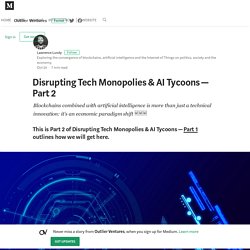
Cryptocurrency Might be a Path to Authoritarianism - The Atlantic. All over town, the parking meters are disappearing. Drivers now pay at a central machine, or with an app. It’s so convenient I sometimes forget to pay entirely—and then suffer the much higher price of a parking ticket. The last time that happened, I wondered: Why can’t my car pay for its own parking automatically?
It’s technically possible. Both my car and my smartphone know my location via GPS. Or imagine this: My car, which is already mostly a computer, enters an agreement to lease time from a parking lot, which is managed by another computer. With computers handling the entire process, I’d never even be able to forget to pay for parking. Scenarios like this are possible when blockchain—the digital transaction record originally invented to validate Bitcoin transactions—gets used for purposes beyond payment. Internet of Things and Blockchain Technology: How Does It Work? "Internet Of Things is when your toaster mines Bitcoins to pay off its gambling debts to the fridge.” When this was tweeted by Andrew Miller in 2015, it rapidly became the go-to meme for anyone slightly cynical about the genuine use cases for Blockchain within the Internet of Things. The idea of a self-actualized toaster with its own digital identity, probably provided by 21 Inc, became as much part of Blockchain popular culture as BitFury's Bitcoin-mining light bulb that never was or Slock.it's self-hiring bicycle.
If we are most likely to understand the Internet of Things (IoT) by describing how it relates to objects we use every day, such as toaster or bicycles, we miss the big picture: a futuristic global network of connected devices, transforming industrial and business processes in a way that we cannot yet comprehend. Apparent NSA tool behind global cyberattack.
Leaked alleged NSA hacking tools appear to be behind a massive cyberattack disrupting hospitals and companies across Europe, Asia and the U.S., with Russia among the hardest-hit countries. The unique malware causing the attacks — which been spotted in tens of thousands of incidents in 99 countries, according to the cyber firm Avast — have forced some hospitals to stop admitting new patients with serious medical conditions and driven other companies to shut down their networks, leaving valuable files unavailable. Story Continued Below The source of the world-wide digital assault seems to be a version of an apparent NSA-created hacking tool that was dumped online in April by a group calling itself the Shadow Brokers. The tool, a type of ransomware, locks up a company’s networks and holds files and data hostage until a fee is paid.
Researchers said the malware is exploiting a Microsoft software flaw. Programmable blockchains in context: Ethereum’s future, by Vinay Gupta. By the end of this article, you’re going to understand blockchains in general (and Ethereum, a next-generation blockchain platform, in particular) well enough to decide what they mean to your life. Spanish version Behold Skynet Ethereum brings up strong emotions. Some have compared it to SkyNet, the distributed artificial intelligence of the Terminator movies.
Others once suggested the entire thing is a pipe dream. How Blockchain Can Bring Financial Services to the Poor - MIT Technology Review. Two billion people worldwide don’t have bank accounts and must conduct their transactions in cash―which can be difficult to manage and presents safety issues. Could blockchain, the technology underlying the digital currency Bitcoin, give them access to financial services? The Bill & Melinda Gates Foundation thinks so, and it is modifying blockchain, which is essentially a secure, reliable digital record-keeping system, to bring the poor into the formal economy.
The initiative is part of the Gates Foundation’s Financial Services for the Poor program―specifically, its Level One Project, which gives governments and central banks a framework for creating national digital payments systems that anyone can use, even those who live on a few dollars a day. This video isn't encoded for your device Level One Project leader Kosta Peric thinks blockchain technology can fulfill some of the conditions that his team thinks are essential for a digital payment platform for the poor. Google's DeepMind plans bitcoin-style health record tracking for hospitals. The Blockchain Will Do to the Financial System What the Internet Did to Media.
Even years into the deployment of the internet, many believed that it was still a fad. Of course, the internet has since become a major influence on our lives, from how we buy goods and services, to the ways we socialize with friends, to the Arab Spring, to the 2016 U.S. presidential election. Yet, in the 1990s, the mainstream press scoffed when Nicholas Negroponte predicted that most of us would soon be reading our news online rather than from a newspaper. L'effet de l'automatisation sur l'emploi : ce qu'on sait et ce qu'on ignore.
Automatisation, robotisation, intelligence artificielle, les progrès du numérique annoncent-ils une grande vague de chômage technologique ? Pas si sûr. D’abord parce que l’homme conserve un avantage comparatif sur la machine, de telle sorte que tous les emplois ne sont pas automatisables, loin de là. Seuls 15 % des salariés français pourraient en l’espèce être remplacés par un robot aujourd'hui. Ensuite et surtout, parce que le contenu des métiers évolue avec le numérique dans un sens qui les rend paradoxalement moins automatisables. What blockchain means for you, your company, and the Internet of Things. February 10, 2017 | Written by: Chris O'Connor Categorized: Business | Security. Know more about Blockchain: Overview, Technology, Application Areas and Use Cases.
“Blockchain technology continues to redefine not only how the exchange sector operates, but the global financial economy as a whole.” – Bob Greifeld, Chief Executive of NASDAQ. Estonian Health Records to Be Secured by Blockchain. The blockchain–based, real-time integrity, network, and data platform Guardtime has announced a partnership with the Estonian eHealth Foundation. The company will secure $1 million USD in health records in the Baltic region used by the Estonian eGovernment infrastructure. Also read: Increasing Bitcoin Block Size vs. Higher Transaction Fees. There is more to blockchain than moving money. It has the potential to transform our lives - here's how.
Blockchain is well-known as a method of exchanging assets, but in future it could also be used for - among other things - welfare distribution, secure voting, land-title transfers, even vaccine distribution. Forbes Welcome. The Blockchain is Perfect for Government Services, Here’s A Blueprint. « Smart contract », où le contrat auto-exécutant. L’apport essentiel d’Ethereum, lorsqu’on la compare aux autres blockchain existantes, se résume dans sa capacité à être programmée à l’aide d’un langage dédié (Solidity). Ce langage est dit « turing-complete », ce qui signifie qu’il permet d’exécuter l’ensemble des fonctions utilisés pour développer une application moderne : c’est un langage de programmation « complet »[1].
Comprendre la blockchain Ethereum - Article 1 : Bitcoin, première implémentation de la blockchain (1/2) Create a Hello World Contract in ethereum. Blockchain defined: PwC. What is the blockchain, what is bitcoin and how can I make money from it? Blockchain – The Next Big Thing for Middleware. Numerai Used 7,500 Faceless Coders Paid in Bitcoin to Build Its Hedge Fund's Brain. Scout. What is this Blockchain Thing? – Startup Grind – Medium. How blockchain will revolutionise far more than money. Can Bitcoin Technology Solve the Migrant Crisis? - WSJ. 12 Companies Leveraging Blockchain for Identification and Authentication. Can The Blockchain Make Refugee Lives Easier? - Bitcoinist.com. Estonian Government Partners with Bitnation to Offer Blockchain Notarization Services to e-Residents. Blockchain-Enabled Cloud: Estonian Government selects Ericsson, Apcera and Guardtime.
Liberland: Europe's Newly Formed Country to Use Bitcoin - Bitcoinist.com.